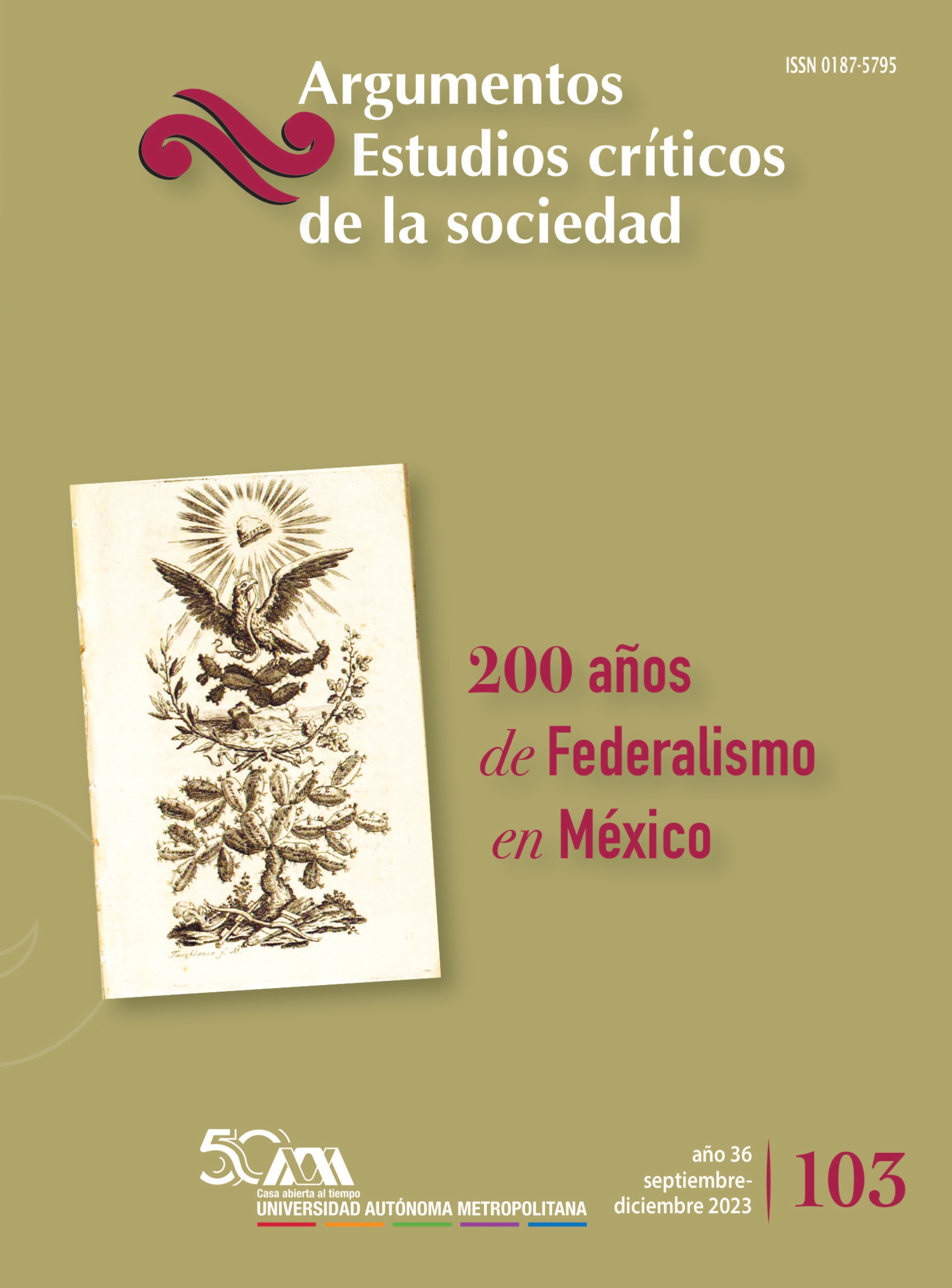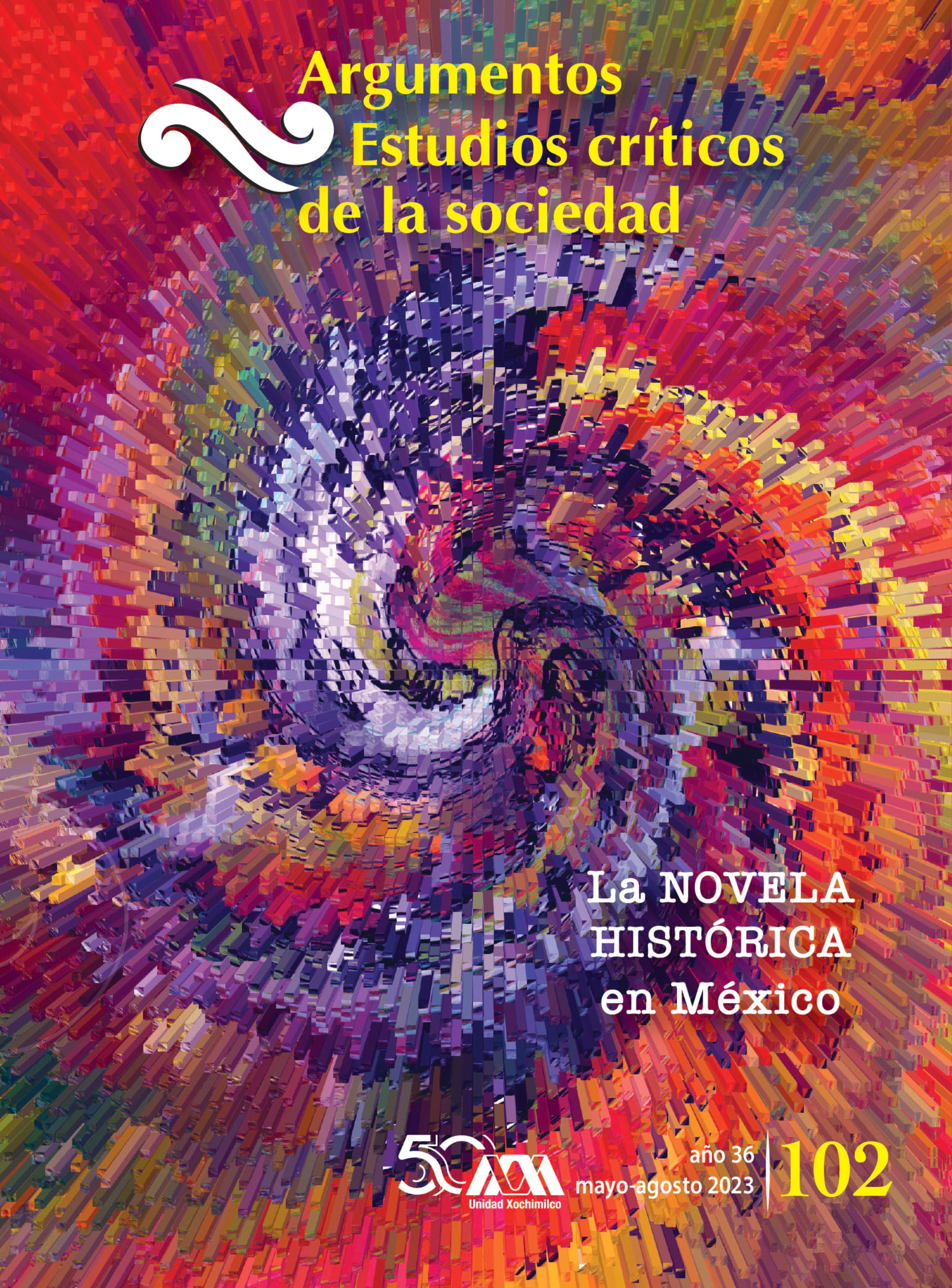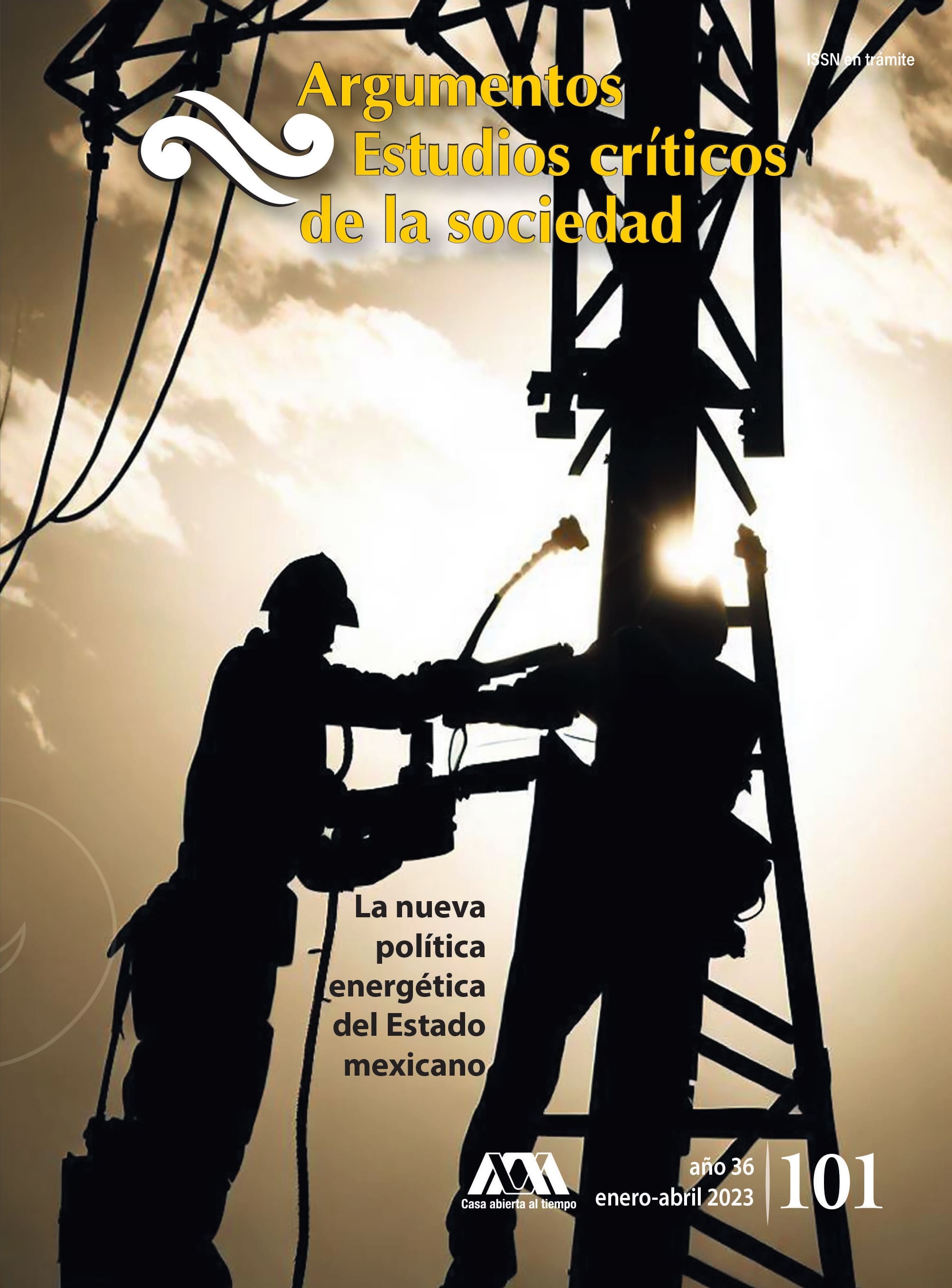La disputa por la transición energética en México en condiciones dependientes
DOI:
https://doi.org/10.24275/uamxoc-dcsh/argumentos/2023101-04Palabras clave:
crítica de la economía política energética, política energética mexicana, transiciones justas, capitalismo de carbón, estudios críticos de la energíaResumen
El objetivo central de este trabajo es analizar los márgenes y horizontes de la transición energética en México. El trabajo se adscribe a los estudios críticos de la energía y la teoría de la dependencia. La metodología utilizada es el análisis crítico de las condiciones globales de la transición en un contexto de capitalismo fósil, para luego abordar cómo este contexto sociohistórico construye el bloqueo de carbono en la política energética mexicana y los horizontes de la disputa contemporánea por una transición energética justa y democrática en México. El ensayo consta de dos secciones: una primera dedicada a la crítica de la economía política de la energía. La segunda ofrece un análisis crítico de la política de transición energética de México.
Citas
Akizu, O., L. Urkidi, G. Bueno, R. Lago, I. Barcena, M. Mantxo, I. Basurko, J. Lopez-Guede et al. (2017). “Emerging energy transitions in the global North and South”, International Journal of Hydrogen Energy, núm. 42, pp. 18044-18063.
Alarcón, F.C. y C. Chartier (2018). “Degrowth, energy democracy, technology and socialecological relations. Discussing a localised energy system in Vaxiö, Sweden”, Journal of Cleaner Production, núm. 197, pp. 175-1765.
Alter, K. y K. Raustalia (2018). “The rise of international regime complexity”, Annual Review of Law and Social Sciences, pp. 1-28.
Álvarez, S. (2019). Geopolítica financier y petróleo. Hegemonía estadunidense en México y Argentina. Fondo de Cultura Económica.
Azam, M. (2021). “A journey from Rio to Paris via Kyoto to facilitate technology transfer to the LDCs under the UNFCCC”, Journal of Property, Planning and Environmental Law, 13(1), pp. 60-84.
Bartra, A. (2013). “Crisis civilizatoria”, en Raúl Ornelas (coord.), Crisis civilizatoria y superación del capitalismo. México: Instituto de Investigaciones Económicas, UNAM.
Bertinat, P. y J. Chemes (2020). Aportes del sector energético a una transición social-ecológica. Friedrich Ebert Stiftung.
Bradshaw, M. (2013). “Sustainability, climate change and transition in global energy”, en A. Goldthau (ed.), The Hanbook of Global Energy Policy. Wiley-Blackwell, pp. 48-63.
Cameron, P. (2014). “In search of investment stability”, en Kim Talus (ed.), Research handbook on international energy law. Edward Elgar.
Cárdenas, J. (2015). “La nueva legislación secundaria en materia energética”, Boletín Mexicano de Derecho Comparado XLVIII(143), pp. 547-613.
Cherp, A. y J. Jewell (2014). “The concept of energy security: Beyond the four as”, Energy Policy, núm. 75, pp. 415-421.
Cherp, A., J. Jewell y A. Goldthau (2011). “Governing global energy: Systems, transitions, complexity”, Global Policy, 2(1), pp. 75-88.
Clark, B. y R. York (2005). “Carbon metabolism: Global capitalism, climate change, and the biospheric rift”, Theory and Society, núm. 34, pp. 391-428.
Cosme, I., R. Santos y D. O’Neill (2017). “Assessing the degrowth discourse: A review and analysis of academic degrowth policy proposals”, Journal of Cleaner Production, núm. 141, pp. 321-334.
Di Muzio, T. (2015). “The IPE and the unfashionable problematic of capital and energy”, en T. Di Muzio y J. Ovadia, Energy, capitalism and world order. Toward a new agenda in international political economy. Palgrave Macmillan.
Dow, M. (2019). Canada’s carbon capitalism: In the age of climate chante [PhD Dissertation. York University].
Dunlap, A. (2018). “Counterinsurgency for wind energy: the Bíi Hioxo wind park in Juchitán, Mexico”, The Journal of Peasant Studies, 45(3), pp. 630-652 doi: <https://doi.org/10.1080/03066150.2016.1259221>.
—— (2021). “Does Renewable Energy Exist? Fossil Fuel+ Technologies and the Search for Renewable Energy”, en S. Batel y D. Rudolph (eds.), A critical approach to the social acceptance of renewable energy infrastructures: going beyond green growth and sustainability. Palgrave Mcmillan.
Ferrari, L. y O. Masera (2020). “¿Qué implica una transición energética sustentable?”, Diálogos ambientales. Spring.
Fornillo, B. (2017). “Hacia una definición de transición energética para Sudamérica: antropoceno, geopolítica y posdesarrollo”, Prácticas de oficio, 2(20), pp. 46-53.
Geocomunes (2021). Alumbrar las contradicciones del Sistema Eléctrico Mexicano y de la transición energética: Preguntas clave para entenderlos y construir otros modelos energéticos. Rosa Luxemburg Stiftung Oficina México, Centroamérica y El Caribe.
Gobierno de México (2022). “Ley de la Industria eléctrica”, Diario Oficial de la Federación, 11 de abril.
Harvey, D. (2005). “El ‘nuevo’ imperialismo: acumulación por desposesión”, Social register 2004. Clacso, pp. 99-129.
Hernández, J. y D. Bonilla (2020). “Examining Mexico’s energy policy under the 4T”, The Extractive Industries and Society, núm. 7, pp. 669-675.
Hickel, J. y G. Kallis (2019). “Is Green growth possible?”, New political economy, abril doi: <https://doi.org/10.1080/13563467.2019.1598964>.
Huber, M. (2013). Lifeblood. Oil, freedom, and the forces of capital. University of Minnesota Press.
Kallis, G. (2019). “Capitalism, socialism, degrowth: A rejoiner”, Capitalism, Nature, Socialism, 30(2), pp. 267-273.
Karlsson-Vinkuyzen, S. (2016). “The UN Energy and Sustainable Development Goals”, en T. Van de Graaf, B. Sovacool, A. Ghohs, F. Kern y M.T. Klare (eds.), The Palgrave handbook of the international political economy of energy. Palgrave Handbooks.
Kirchherr, J. y F. Urban (2018). “Technology transfer and cooperation for low carbon energy technology: Analyzing 30 years of scholarship and proposing a research agenda” Energy Policy, núm. 119, pp. 600-609.
Konoplyanik, A. (2014). “Multilateral and bilateral energy investment treaties: Do we need a global solution? The Energy Charter Treaty as an objective result of the evolution of international energy markets and instruments of investment protection and stimulation”, en K. Talus (ed.), Research handbook on international energy law. Edward Elgar.
Mälm, A. (2012). “China as chimney of the world: The fossil capital hypothesis”, Organization & Environment, 25(2), pp. 152-158.
Mälm, A. (2018). “Long waves of fossil development: Periodizing energy and capital”, Mediations, 31(2), pp. 17-34.
Marini, R.M. (1973). Dialéctica de la dependencia. México: ERA.
Martínez-Allier, J., U. Pascual, F.D. Vivien y E. Zaccai (2010). “Sustainable degrowth: Mapping the context, criticisms and future prospects of an emergent paradigm”, Ecological Economics, núm. 69, pp. 1741-1747.
Melgarito, B.E. (2019). “Notas acerca del Estado y el derecho en el capitalismo dependiente latinoamericano”, en D. Sandoval, B.E. Melgarito y L. Caraballo, Derecho, lucha de clases y reconfiguración del capital en Nuestra América. Tomo I, Clacso.
Minas, S. (2020). “The Paris Agreement’s technology frame and the need for ‘transformational change’”, Carbon & Climate Law Review, núm. 4, pp. 241-254.
Minnerop, P. (2020). “The legal effect of the ‘Paris Rulebook’ under the Doctrine of Treaty Interpretation”, en P. Cameron, X. Mu y V. Roeben (ed.), The global energy transition. Law, policy, and economics of energy in the 21st Century. Hart Publishing.
Moore, J.W. (2016). “The Rise of Cheap Nature”, Sociology Faculty Scholarship, núm. 2 <https://orb.binghamton.edu/sociology_fac/2>.
—— (2020). El capitalismo en la trama de la vida. Ecología y acumulación del capital. Madrid: Traficantes de sueños.
Moreno, C. (2012). “La economía verde y mercados de carbono”, Capitlismo Verde. Estudios Ecologistas, núm. 8.
Newell, P. (2019). “Transformismo or transformation? The global political economy of energy transitions”, Review of International Political Economy, 26(1), pp. 25-28 doi: <https://doi.org/10.1080/09692290.2018.1511448>.
—— (2021). Power shift. The global political economy of energy transitions. Cambridge University Press.
O’Connor, J. (2002). “¿Es posible el capitalismo verde?”, en H. Alimonda (comp.), Ecología política. Naturaleza, sociedad y utopía. Clacso.
Ocampo, E. (2021). “Desafíos de un modelo energético sostenible: México 2050”, en Movilidad y energía en México, Centro de Investigaciones Interdisciplinarias en Ciencias y Humanidades-UNAM, por publicarse (documento enviado por el autor al Diplomado Derecho energético, UNAM).
Puyana, A. e I. Rodríguez (2020). “Seguridad energética en México y Canadá de 1980 a 2016: centralidad del petróleo y la incorporación de temas ambientales”, Norteamérica. Revista Académica del CISAN-UNAM, 15(2), pp. 1-29.
Rajamani, L. y J. Werksman (2018). “The legal character and operational relevance of the Paris Agreement’s temperature goal”, Philosophical Transactions Royal Society A, núm. 376, pp. 1-14.
Rodríguez Padilla, V. (2018). “Seguridad e integración energética con Estados Unidos: de la confianza a la incertidumbre”, Norteamérica, 13(12), pp. 61-83.
Saxe-Fernández, J. (2018). “Capitalismo histórico y contemporáneo (1750-presente): formación social vinculada al colapso climático antropogénico en curso”, en J. Saxe-Fernández (coord.), Sociología política del colapso climático antropogénico. Capitalismo fósil, explotación de combustibles, no convencionales y geopolítica de la energía. México: UNAM-CEIICH.
Schill, S. (2014). “The interface between national and international energy law”, en K. Talus (ed.), Research Handbook on International Energy Law. Edward Elgar.
Secretaría de Energía (Sener) (2020). Programa Sectorial de Energía 2020-2024. Gobierno de México.
—— (2020a). Estrategia de transición para promover el uso de tecnología y combustibles más limpios. Gobierno de México.
Selinova, Y. (2014). “The WTO agreements and energy”, en K. Talus (ed.), Research Handbook on International Energy Law. Edward Elgar.
Shaffer G. y M. Pollack (2010). “Hard vs. soft law: Alternatives, complements, and antagonists in international governance”, Minnesota Law Review, núm. 94, pp. 706-797.
Talus, K. (2014). “Internationalization of energy law”, en K. Talus (ed.), Research Handbook on International Energy Law. Edward Elgar.
Tornel, C. (2020). “Integrating social and justice dimensions to energy transitions: The case of Mexico”, en L. Guimarães (ed.), The regulation and policy of Latin American energy transitions. Elsevier Science.
Tornel, C. et al. (2022). Transición energética en América Latina y el Caribe. Friedrich Ebert Stifftung.
Trommer, S. y T. Di Muzio (2015). “The political economy of trade in the age of carbon energy”, en T. Di Muzio y J. Ovadia (ed.), Energy capitalism, and world order. Toward a new agenda in international political economy. Palgrave Macmillan.
Unruh, G. (2000). “Understanding carbon lock-in”, Energy Policy, núm. 28, pp. 817-830.
Urkidi, L. et al. (2015). Transiciones energéticas: democracia, justicia energetica y sostenibilidad de la vida. Argitalpen Zerbitzua Servicio Editorial-Universidad del País Vasco.
Van de Graaf, T. y B. Sovacool (2020). Global energy politics. Polity Press.
Vargas Suárez, R. (2014). El papel de México en la integración y seguridad energética de Norteamérica. México: Centro de Estudios sobre América del Norte-UNAM.
Vázquez Pérez, J. (2021). “Iniciativa de reforma a la Ley de la Industria Eléctrica: retroceso en materia energética”, Centro de Investigación Económica y Presupuestaria <https://ciep.mx/iniciativa-de-reforma-a-la-ley-de-la-industria-electrica-retroceso-en-materia-energetica/>.
Weiss, M. y C. Cattaneo (2017). “Degrowth-Taking stock and reviewing an emerging academic paradigm”, Ecological Economics, núm. 137, pp. 220-230 <https://doi.org/10.1016/j.ecolecon.2017.01.014>.
Zamora, B. (2015). “Las reformas constitucionales sobre hidrocarburos y sus efectos en las comunidades indígenas y ejidos”, en J. Mendoza y J M. Martinelli (coord.), Reformas estructurales: privatización y despojo social. México: Universidad Autónoma Metropolitana-Iztapalapa/Ediciones del lirio.








